BANK OF ALBANIA
PRESS RELEASE
Albanian Delegation: Virtual Meetings with representatives of the IMF and the WBG
Publication date: 20.10.2020
On 19 October 2020, the Governor of the Bank of Albania, Mr Gent Sejko, and the Minister of Finance and Economy, Ms Anila Denaj, had virtual meetings with Ms Anna Bjerde, the World Bank Vice President for Europe and Central Asia, and with Mr Alfred Kammer, Director of the European Department at the International Monetary Fund, in the framework of the Virtual Annual Meetings of the International Monetary Fund (IMF) and the World Bank Group (WBG).
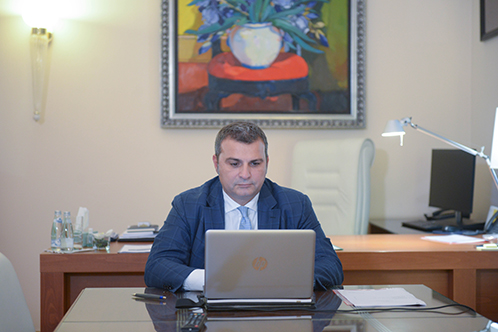
In these meetings, the discussions focused on the impact of pandemic on the Albanian economy, developments in the financial and banking system, and expectations related to the economic indicators in the future.
Both Governor Sejko and Minister Denaj stated that the Albanian economy was strongly hit by the pandemic during the first half of year, particularly in the second quarter of 2020. Thus, the major part of economic indicators is expected, this year, to be affected by the negative consequences of pandemic. Meanwhile, in the medium-term perspective, the duration and impact of pandemic will be crucial to determine the recovery path of the Albanian economy, which is expected to begin to rebound in 2021.
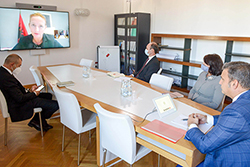
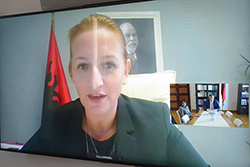
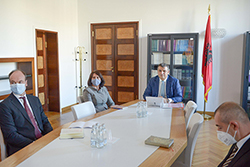
Regarding the banking system, Governor Sejko highlighted that the system entered the pandemic with good liquidity and capitalisation levels. The banking system has continued normally its activity, with no interruptions, and has expressed its willingness to provide the necessary contribution to face and overcome the situation created by Covid-19 pandemic.
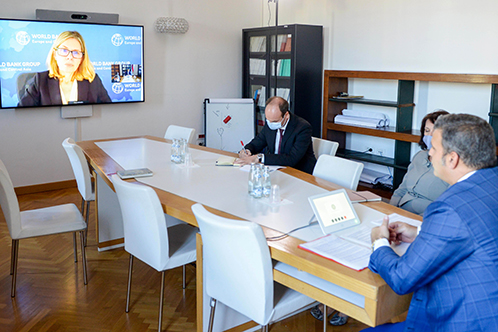
In addition, the domestic financial markets appear calm with stable dominant interest rates. The foreign exchange rate appears stable, beyond the fact that, at the beginning of the implemented constraints due to pandemic outbreak, the domestic currency was depreciated.
Governor Seiko introduced the measures taken by the Bank of Albania as a response to the shock arisen by the pandemic: the strengthening of monetary stimulus through the reduction of policy interest rate and increase of liquidity injections; amendments to the regulatory framework, which aim at temporary easing the credit payments and the restructuring of bank loans to customers facing financial difficulties due to this situation.
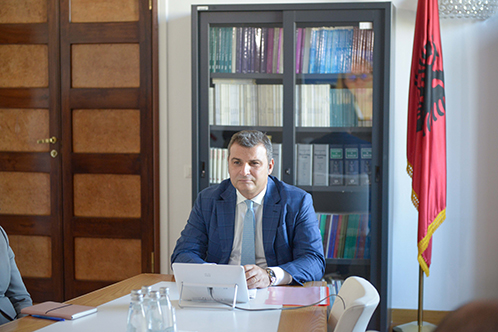
Regarding the accommodative monetary policy implemented by the Bank of Albania, Mr Sejko pointed out that this stance remains adequate for providing the necessary stimulus to the economic growth and for the return of inflation to target within 2022.
Minister Denaj highlighted that fiscal policy, in addition, has had key role in dealing with the situation, by financially supporting citizens and providing liquidity to affected businesses. Also, the funds of sovereign guarantee to private companies, have contributed as a continuous flow of funds, by helping the liquidity situation of businesses, and supporting them in difficult moments.
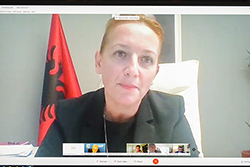
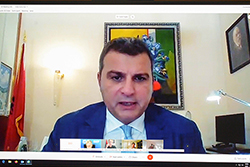

Ms Denaj emphasised that, notwithstanding GDP contracted -10.2% in the first six months of the year, the forecasts for the year remain at only -5%, accompanied with an unemployment rate of 12.5%. The Ministry of Finance and Economy is committed to return to fiscal consolidation, with a positive primary balance from 2022, and for sure from 2023. This forecast is also reflected in the changes to the Organic Budget Law. Minister Denaj also reiterated the changes to the draft budget for the next year, focusing on the increase of capital expenditure, rise of wages in priority sectors and the re-construction project. The Minister underlined that debt projections are still expected to expand, although at lower levels during the year of pandemic, returning to fiscal consolidation within the next five years.
The IMF and the WBG representatives commended the contribution of Albanian authorities in managing the pandemic shock on economy, particularly through the harmonisation of both fiscal and monetary policies, the support provided to citizens and businesses affected by the pandemic, and the maintaining of macroeconomic stability of Albania.
In these meetings, the Albanian delegation thanked the IMF and the WBG representatives for the ongoing assistance to the public institutions of the country. Also, the IMF and the WBG delegation assessed the Rapid Financial Instrument, as a rather valuable possibility, provided to Albania in the right time, to address the various needs that may arise due this pandemic situation.

 Linkedin
Linkedin
 Twitter
Twitter
 Youtube
Youtube
 Facebook
Facebook
 Flickr
Flickr
 RSS
RSS
 Subscribe
Subscribe
 Feedback
Feedback